Scottish Refugee Poverty: Experiences and Views of Refugees in Glasgow
VerifiedAdded on 2022/02/14
|29
|14025
|18
Report
AI Summary
This report, conducted by the Scottish Poverty Information Unit (SPIU) for the Scottish Refugee Council (SRC), investigates the experiences and perspectives of refugees on poverty in Glasgow, Scotland. The research provides context on the background of asylum seekers and refugees, including the impact of policy changes such as the Immigration and Asylum Act 1999 and the New Asylum Model (NAM). It explores the views of refugees on poverty, including housing, employment, and access to support services, and highlights the challenges faced by refugees in integrating into Scottish society. The report also provides an overview of poverty in Scotland, including statistics and the groups most at risk. The study's findings contribute to a deeper understanding of the challenges refugees face, and it offers valuable insights for policymakers and support organizations working to address poverty and promote social justice for refugees in Scotland.
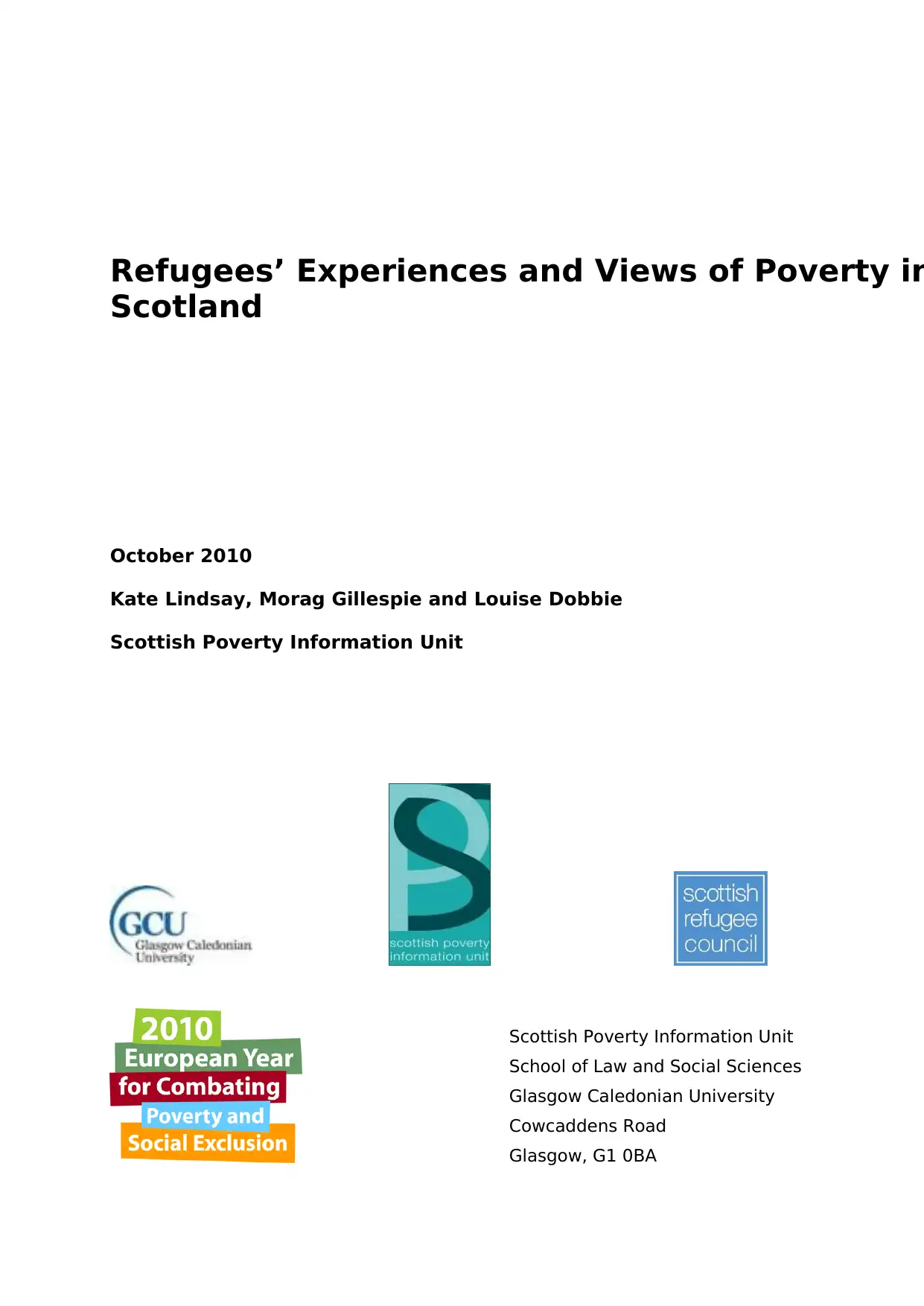
Refugees’ Experiences and Views of Poverty in
Scotland
October 2010
Kate Lindsay, Morag Gillespie and Louise Dobbie
Scottish Poverty Information Unit
Scottish Poverty Information Unit
School of Law and Social Sciences
Glasgow Caledonian University
Cowcaddens Road
Glasgow, G1 0BA
Scotland
October 2010
Kate Lindsay, Morag Gillespie and Louise Dobbie
Scottish Poverty Information Unit
Scottish Poverty Information Unit
School of Law and Social Sciences
Glasgow Caledonian University
Cowcaddens Road
Glasgow, G1 0BA
Paraphrase This Document
Need a fresh take? Get an instant paraphrase of this document with our AI Paraphraser
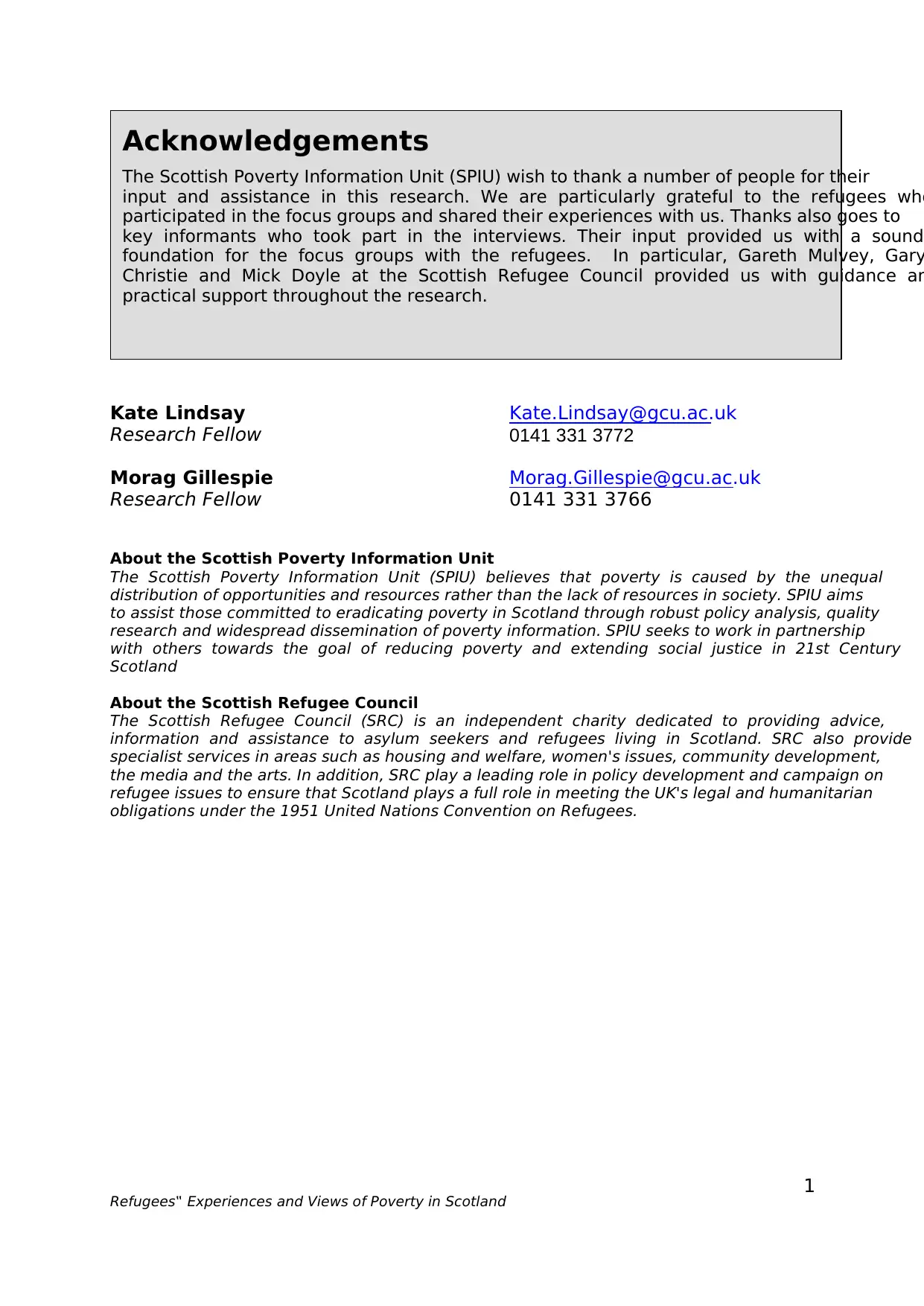
Refugees‟ Experiences and Views of Poverty in Scotland
1
Kate Lindsay
Research Fellow
Kate.Lindsay@gcu.ac.uk
0141 331 3772
Morag Gillespie
Research Fellow
Morag.Gillespie@gcu.ac.uk
0141 331 3766
About the Scottish Poverty Information Unit
The Scottish Poverty Information Unit (SPIU) believes that poverty is caused by the unequal
distribution of opportunities and resources rather than the lack of resources in society. SPIU aims
to assist those committed to eradicating poverty in Scotland through robust policy analysis, quality
research and widespread dissemination of poverty information. SPIU seeks to work in partnership
with others towards the goal of reducing poverty and extending social justice in 21st Century
Scotland
About the Scottish Refugee Council
The Scottish Refugee Council (SRC) is an independent charity dedicated to providing advice,
information and assistance to asylum seekers and refugees living in Scotland. SRC also provide
specialist services in areas such as housing and welfare, women's issues, community development,
the media and the arts. In addition, SRC play a leading role in policy development and campaign on
refugee issues to ensure that Scotland plays a full role in meeting the UK's legal and humanitarian
obligations under the 1951 United Nations Convention on Refugees.
Acknowledgements
The Scottish Poverty Information Unit (SPIU) wish to thank a number of people for their
input and assistance in this research. We are particularly grateful to the refugees who
participated in the focus groups and shared their experiences with us. Thanks also goes to
key informants who took part in the interviews. Their input provided us with a sound
foundation for the focus groups with the refugees. In particular, Gareth Mulvey, Gary
Christie and Mick Doyle at the Scottish Refugee Council provided us with guidance an
practical support throughout the research.
1
Kate Lindsay
Research Fellow
Kate.Lindsay@gcu.ac.uk
0141 331 3772
Morag Gillespie
Research Fellow
Morag.Gillespie@gcu.ac.uk
0141 331 3766
About the Scottish Poverty Information Unit
The Scottish Poverty Information Unit (SPIU) believes that poverty is caused by the unequal
distribution of opportunities and resources rather than the lack of resources in society. SPIU aims
to assist those committed to eradicating poverty in Scotland through robust policy analysis, quality
research and widespread dissemination of poverty information. SPIU seeks to work in partnership
with others towards the goal of reducing poverty and extending social justice in 21st Century
Scotland
About the Scottish Refugee Council
The Scottish Refugee Council (SRC) is an independent charity dedicated to providing advice,
information and assistance to asylum seekers and refugees living in Scotland. SRC also provide
specialist services in areas such as housing and welfare, women's issues, community development,
the media and the arts. In addition, SRC play a leading role in policy development and campaign on
refugee issues to ensure that Scotland plays a full role in meeting the UK's legal and humanitarian
obligations under the 1951 United Nations Convention on Refugees.
Acknowledgements
The Scottish Poverty Information Unit (SPIU) wish to thank a number of people for their
input and assistance in this research. We are particularly grateful to the refugees who
participated in the focus groups and shared their experiences with us. Thanks also goes to
key informants who took part in the interviews. Their input provided us with a sound
foundation for the focus groups with the refugees. In particular, Gareth Mulvey, Gary
Christie and Mick Doyle at the Scottish Refugee Council provided us with guidance an
practical support throughout the research.
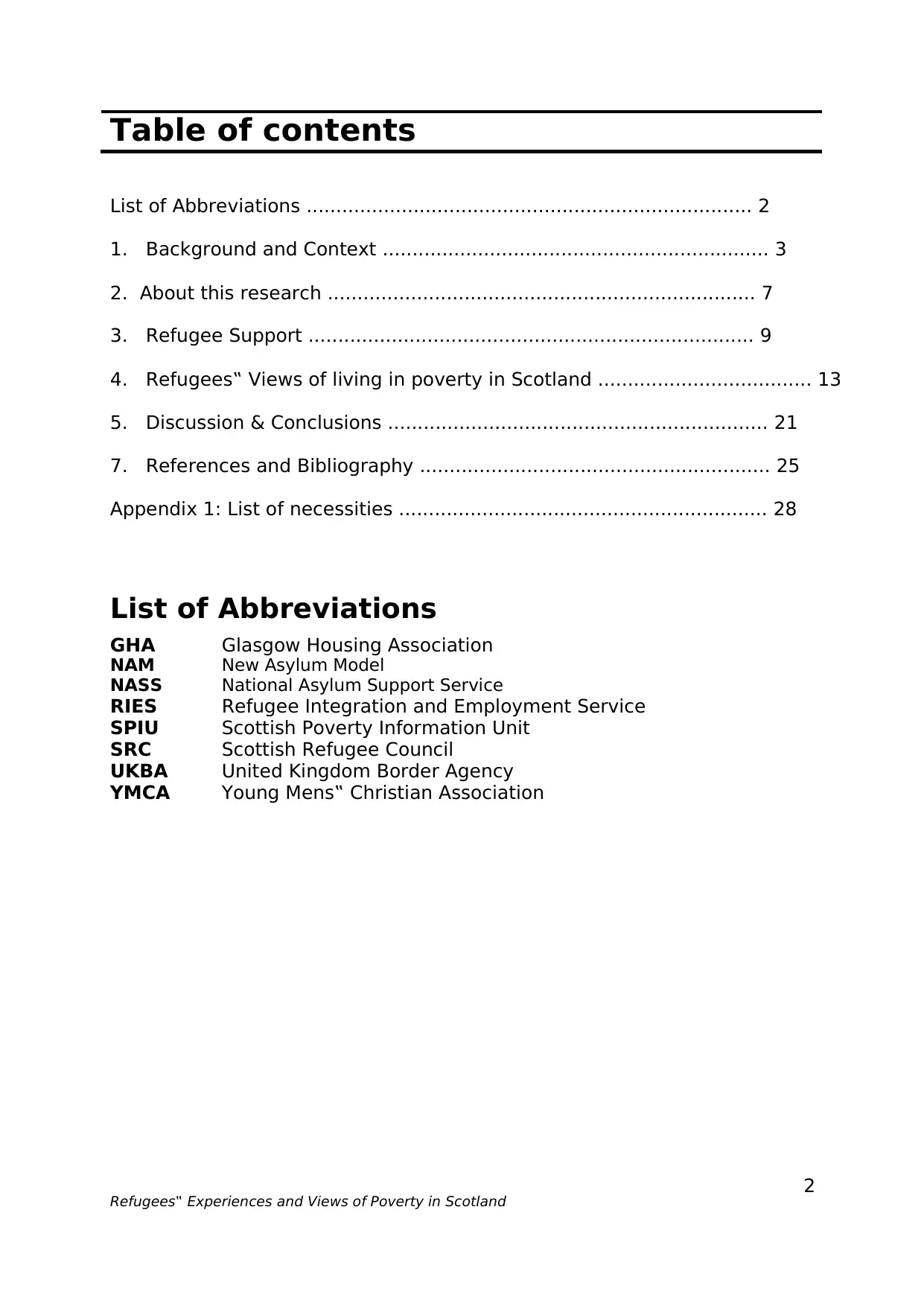
Refugees‟ Experiences and Views of Poverty in Scotland
2
Table of contents
List of Abbreviations ........................................................................... 2
1. Background and Context ................................................................. 3
2. About this research ........................................................................ 7
3. Refugee Support ........................................................................... 9
4. Refugees‟ Views of living in poverty in Scotland .................................... 13
5. Discussion & Conclusions ................................................................ 21
7. References and Bibliography ........................................................... 25
Appendix 1: List of necessities .............................................................. 28
List of Abbreviations
GHA Glasgow Housing Association
NAM New Asylum Model
NASS National Asylum Support Service
RIES Refugee Integration and Employment Service
SPIU Scottish Poverty Information Unit
SRC Scottish Refugee Council
UKBA United Kingdom Border Agency
YMCA Young Mens‟ Christian Association
2
Table of contents
List of Abbreviations ........................................................................... 2
1. Background and Context ................................................................. 3
2. About this research ........................................................................ 7
3. Refugee Support ........................................................................... 9
4. Refugees‟ Views of living in poverty in Scotland .................................... 13
5. Discussion & Conclusions ................................................................ 21
7. References and Bibliography ........................................................... 25
Appendix 1: List of necessities .............................................................. 28
List of Abbreviations
GHA Glasgow Housing Association
NAM New Asylum Model
NASS National Asylum Support Service
RIES Refugee Integration and Employment Service
SPIU Scottish Poverty Information Unit
SRC Scottish Refugee Council
UKBA United Kingdom Border Agency
YMCA Young Mens‟ Christian Association
⊘ This is a preview!⊘
Do you want full access?
Subscribe today to unlock all pages.

Trusted by 1+ million students worldwide
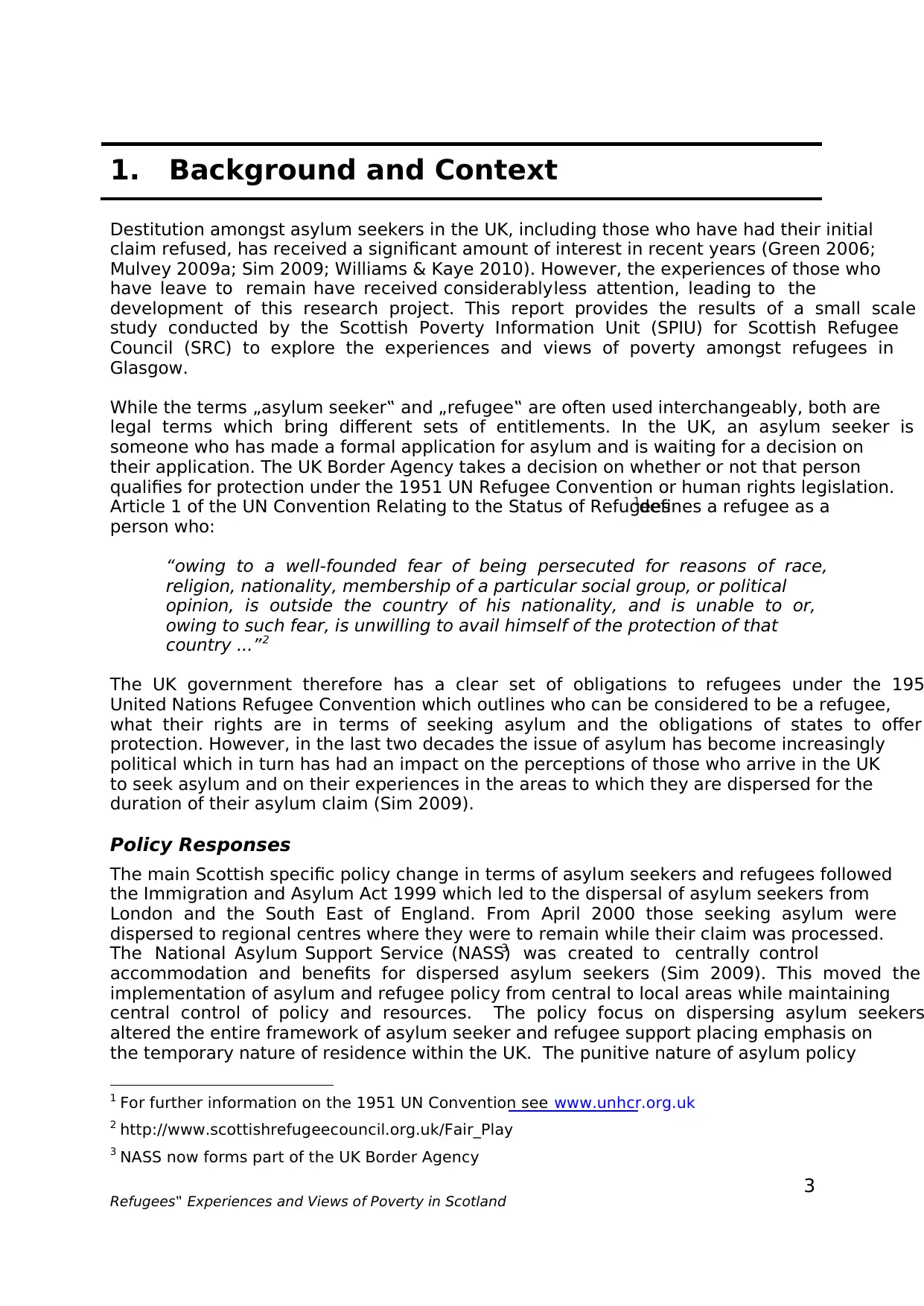
Refugees‟ Experiences and Views of Poverty in Scotland
3
1. Background and Context
Destitution amongst asylum seekers in the UK, including those who have had their initial
claim refused, has received a significant amount of interest in recent years (Green 2006;
Mulvey 2009a; Sim 2009; Williams & Kaye 2010). However, the experiences of those who
have leave to remain have received considerably less attention, leading to the
development of this research project. This report provides the results of a small scale
study conducted by the Scottish Poverty Information Unit (SPIU) for Scottish Refugee
Council (SRC) to explore the experiences and views of poverty amongst refugees in
Glasgow.
While the terms „asylum seeker‟ and „refugee‟ are often used interchangeably, both are
legal terms which bring different sets of entitlements. In the UK, an asylum seeker is
someone who has made a formal application for asylum and is waiting for a decision on
their application. The UK Border Agency takes a decision on whether or not that person
qualifies for protection under the 1951 UN Refugee Convention or human rights legislation.
Article 1 of the UN Convention Relating to the Status of Refugees1defines a refugee as a
person who:
“owing to a well-founded fear of being persecuted for reasons of race,
religion, nationality, membership of a particular social group, or political
opinion, is outside the country of his nationality, and is unable to or,
owing to such fear, is unwilling to avail himself of the protection of that
country ...” 2
The UK government therefore has a clear set of obligations to refugees under the 195
United Nations Refugee Convention which outlines who can be considered to be a refugee,
what their rights are in terms of seeking asylum and the obligations of states to offer
protection. However, in the last two decades the issue of asylum has become increasingly
political which in turn has had an impact on the perceptions of those who arrive in the UK
to seek asylum and on their experiences in the areas to which they are dispersed for the
duration of their asylum claim (Sim 2009).
Policy Responses
The main Scottish specific policy change in terms of asylum seekers and refugees followed
the Immigration and Asylum Act 1999 which led to the dispersal of asylum seekers from
London and the South East of England. From April 2000 those seeking asylum were
dispersed to regional centres where they were to remain while their claim was processed.
The National Asylum Support Service (NASS)3 was created to centrally control
accommodation and benefits for dispersed asylum seekers (Sim 2009). This moved the
implementation of asylum and refugee policy from central to local areas while maintaining
central control of policy and resources. The policy focus on dispersing asylum seekers
altered the entire framework of asylum seeker and refugee support placing emphasis on
the temporary nature of residence within the UK. The punitive nature of asylum policy
1 For further information on the 1951 UN Convention see www.unhcr.org.uk
2 http://www.scottishrefugeecouncil.org.uk/Fair_Play
3 NASS now forms part of the UK Border Agency
3
1. Background and Context
Destitution amongst asylum seekers in the UK, including those who have had their initial
claim refused, has received a significant amount of interest in recent years (Green 2006;
Mulvey 2009a; Sim 2009; Williams & Kaye 2010). However, the experiences of those who
have leave to remain have received considerably less attention, leading to the
development of this research project. This report provides the results of a small scale
study conducted by the Scottish Poverty Information Unit (SPIU) for Scottish Refugee
Council (SRC) to explore the experiences and views of poverty amongst refugees in
Glasgow.
While the terms „asylum seeker‟ and „refugee‟ are often used interchangeably, both are
legal terms which bring different sets of entitlements. In the UK, an asylum seeker is
someone who has made a formal application for asylum and is waiting for a decision on
their application. The UK Border Agency takes a decision on whether or not that person
qualifies for protection under the 1951 UN Refugee Convention or human rights legislation.
Article 1 of the UN Convention Relating to the Status of Refugees1defines a refugee as a
person who:
“owing to a well-founded fear of being persecuted for reasons of race,
religion, nationality, membership of a particular social group, or political
opinion, is outside the country of his nationality, and is unable to or,
owing to such fear, is unwilling to avail himself of the protection of that
country ...” 2
The UK government therefore has a clear set of obligations to refugees under the 195
United Nations Refugee Convention which outlines who can be considered to be a refugee,
what their rights are in terms of seeking asylum and the obligations of states to offer
protection. However, in the last two decades the issue of asylum has become increasingly
political which in turn has had an impact on the perceptions of those who arrive in the UK
to seek asylum and on their experiences in the areas to which they are dispersed for the
duration of their asylum claim (Sim 2009).
Policy Responses
The main Scottish specific policy change in terms of asylum seekers and refugees followed
the Immigration and Asylum Act 1999 which led to the dispersal of asylum seekers from
London and the South East of England. From April 2000 those seeking asylum were
dispersed to regional centres where they were to remain while their claim was processed.
The National Asylum Support Service (NASS)3 was created to centrally control
accommodation and benefits for dispersed asylum seekers (Sim 2009). This moved the
implementation of asylum and refugee policy from central to local areas while maintaining
central control of policy and resources. The policy focus on dispersing asylum seekers
altered the entire framework of asylum seeker and refugee support placing emphasis on
the temporary nature of residence within the UK. The punitive nature of asylum policy
1 For further information on the 1951 UN Convention see www.unhcr.org.uk
2 http://www.scottishrefugeecouncil.org.uk/Fair_Play
3 NASS now forms part of the UK Border Agency
Paraphrase This Document
Need a fresh take? Get an instant paraphrase of this document with our AI Paraphraser
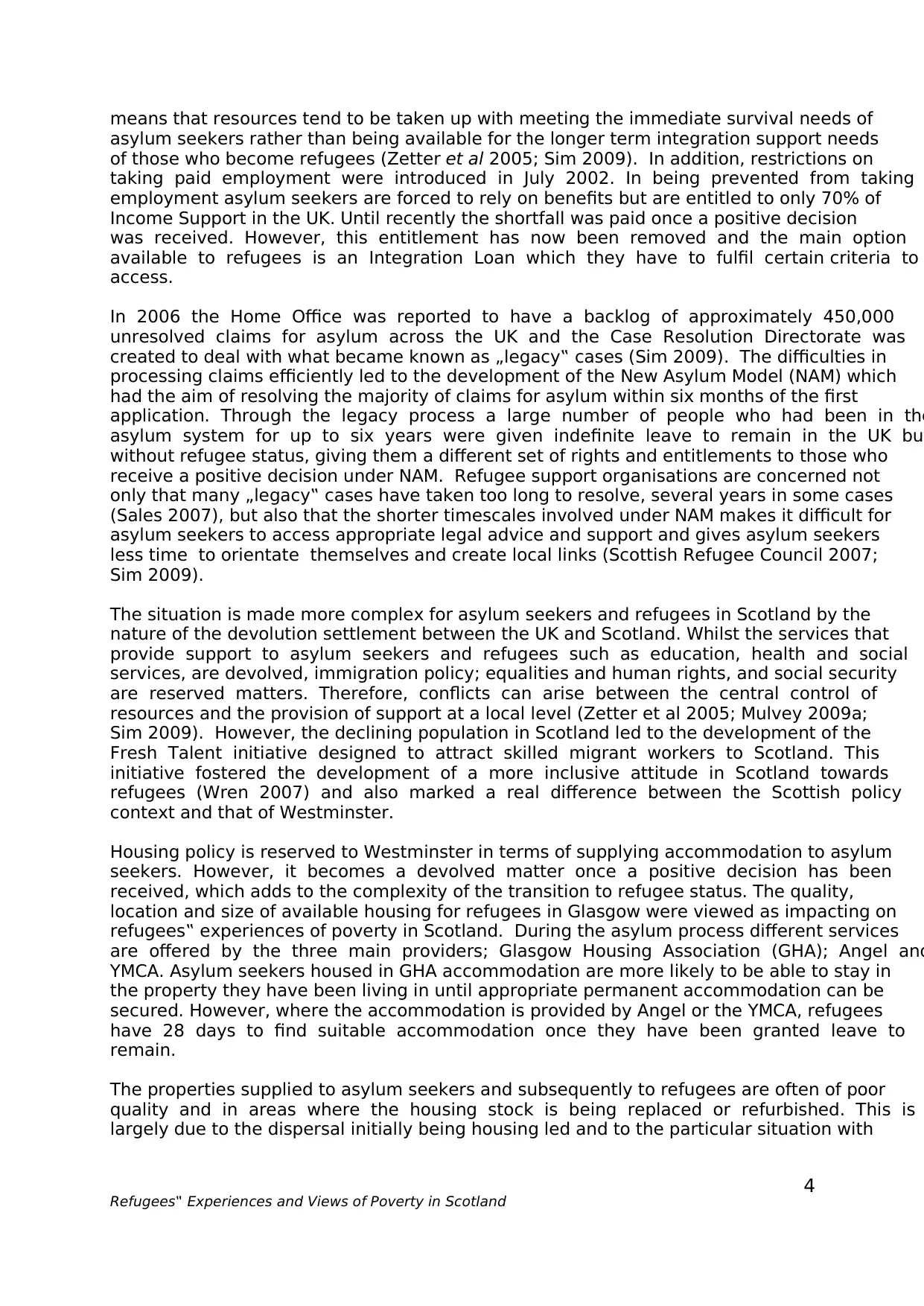
Refugees‟ Experiences and Views of Poverty in Scotland
4
means that resources tend to be taken up with meeting the immediate survival needs of
asylum seekers rather than being available for the longer term integration support needs
of those who become refugees (Zetter et al 2005; Sim 2009). In addition, restrictions on
taking paid employment were introduced in July 2002. In being prevented from taking
employment asylum seekers are forced to rely on benefits but are entitled to only 70% of
Income Support in the UK. Until recently the shortfall was paid once a positive decision
was received. However, this entitlement has now been removed and the main option
available to refugees is an Integration Loan which they have to fulfil certain criteria to
access.
In 2006 the Home Office was reported to have a backlog of approximately 450,000
unresolved claims for asylum across the UK and the Case Resolution Directorate was
created to deal with what became known as „legacy‟ cases (Sim 2009). The difficulties in
processing claims efficiently led to the development of the New Asylum Model (NAM) which
had the aim of resolving the majority of claims for asylum within six months of the first
application. Through the legacy process a large number of people who had been in the
asylum system for up to six years were given indefinite leave to remain in the UK bu
without refugee status, giving them a different set of rights and entitlements to those who
receive a positive decision under NAM. Refugee support organisations are concerned not
only that many „legacy‟ cases have taken too long to resolve, several years in some cases
(Sales 2007), but also that the shorter timescales involved under NAM makes it difficult for
asylum seekers to access appropriate legal advice and support and gives asylum seekers
less time to orientate themselves and create local links (Scottish Refugee Council 2007;
Sim 2009).
The situation is made more complex for asylum seekers and refugees in Scotland by the
nature of the devolution settlement between the UK and Scotland. Whilst the services that
provide support to asylum seekers and refugees such as education, health and social
services, are devolved, immigration policy; equalities and human rights, and social security
are reserved matters. Therefore, conflicts can arise between the central control of
resources and the provision of support at a local level (Zetter et al 2005; Mulvey 2009a;
Sim 2009). However, the declining population in Scotland led to the development of the
Fresh Talent initiative designed to attract skilled migrant workers to Scotland. This
initiative fostered the development of a more inclusive attitude in Scotland towards
refugees (Wren 2007) and also marked a real difference between the Scottish policy
context and that of Westminster.
Housing policy is reserved to Westminster in terms of supplying accommodation to asylum
seekers. However, it becomes a devolved matter once a positive decision has been
received, which adds to the complexity of the transition to refugee status. The quality,
location and size of available housing for refugees in Glasgow were viewed as impacting on
refugees‟ experiences of poverty in Scotland. During the asylum process different services
are offered by the three main providers; Glasgow Housing Association (GHA); Angel and
YMCA. Asylum seekers housed in GHA accommodation are more likely to be able to stay in
the property they have been living in until appropriate permanent accommodation can be
secured. However, where the accommodation is provided by Angel or the YMCA, refugees
have 28 days to find suitable accommodation once they have been granted leave to
remain.
The properties supplied to asylum seekers and subsequently to refugees are often of poor
quality and in areas where the housing stock is being replaced or refurbished. This is
largely due to the dispersal initially being housing led and to the particular situation with
4
means that resources tend to be taken up with meeting the immediate survival needs of
asylum seekers rather than being available for the longer term integration support needs
of those who become refugees (Zetter et al 2005; Sim 2009). In addition, restrictions on
taking paid employment were introduced in July 2002. In being prevented from taking
employment asylum seekers are forced to rely on benefits but are entitled to only 70% of
Income Support in the UK. Until recently the shortfall was paid once a positive decision
was received. However, this entitlement has now been removed and the main option
available to refugees is an Integration Loan which they have to fulfil certain criteria to
access.
In 2006 the Home Office was reported to have a backlog of approximately 450,000
unresolved claims for asylum across the UK and the Case Resolution Directorate was
created to deal with what became known as „legacy‟ cases (Sim 2009). The difficulties in
processing claims efficiently led to the development of the New Asylum Model (NAM) which
had the aim of resolving the majority of claims for asylum within six months of the first
application. Through the legacy process a large number of people who had been in the
asylum system for up to six years were given indefinite leave to remain in the UK bu
without refugee status, giving them a different set of rights and entitlements to those who
receive a positive decision under NAM. Refugee support organisations are concerned not
only that many „legacy‟ cases have taken too long to resolve, several years in some cases
(Sales 2007), but also that the shorter timescales involved under NAM makes it difficult for
asylum seekers to access appropriate legal advice and support and gives asylum seekers
less time to orientate themselves and create local links (Scottish Refugee Council 2007;
Sim 2009).
The situation is made more complex for asylum seekers and refugees in Scotland by the
nature of the devolution settlement between the UK and Scotland. Whilst the services that
provide support to asylum seekers and refugees such as education, health and social
services, are devolved, immigration policy; equalities and human rights, and social security
are reserved matters. Therefore, conflicts can arise between the central control of
resources and the provision of support at a local level (Zetter et al 2005; Mulvey 2009a;
Sim 2009). However, the declining population in Scotland led to the development of the
Fresh Talent initiative designed to attract skilled migrant workers to Scotland. This
initiative fostered the development of a more inclusive attitude in Scotland towards
refugees (Wren 2007) and also marked a real difference between the Scottish policy
context and that of Westminster.
Housing policy is reserved to Westminster in terms of supplying accommodation to asylum
seekers. However, it becomes a devolved matter once a positive decision has been
received, which adds to the complexity of the transition to refugee status. The quality,
location and size of available housing for refugees in Glasgow were viewed as impacting on
refugees‟ experiences of poverty in Scotland. During the asylum process different services
are offered by the three main providers; Glasgow Housing Association (GHA); Angel and
YMCA. Asylum seekers housed in GHA accommodation are more likely to be able to stay in
the property they have been living in until appropriate permanent accommodation can be
secured. However, where the accommodation is provided by Angel or the YMCA, refugees
have 28 days to find suitable accommodation once they have been granted leave to
remain.
The properties supplied to asylum seekers and subsequently to refugees are often of poor
quality and in areas where the housing stock is being replaced or refurbished. This is
largely due to the dispersal initially being housing led and to the particular situation with
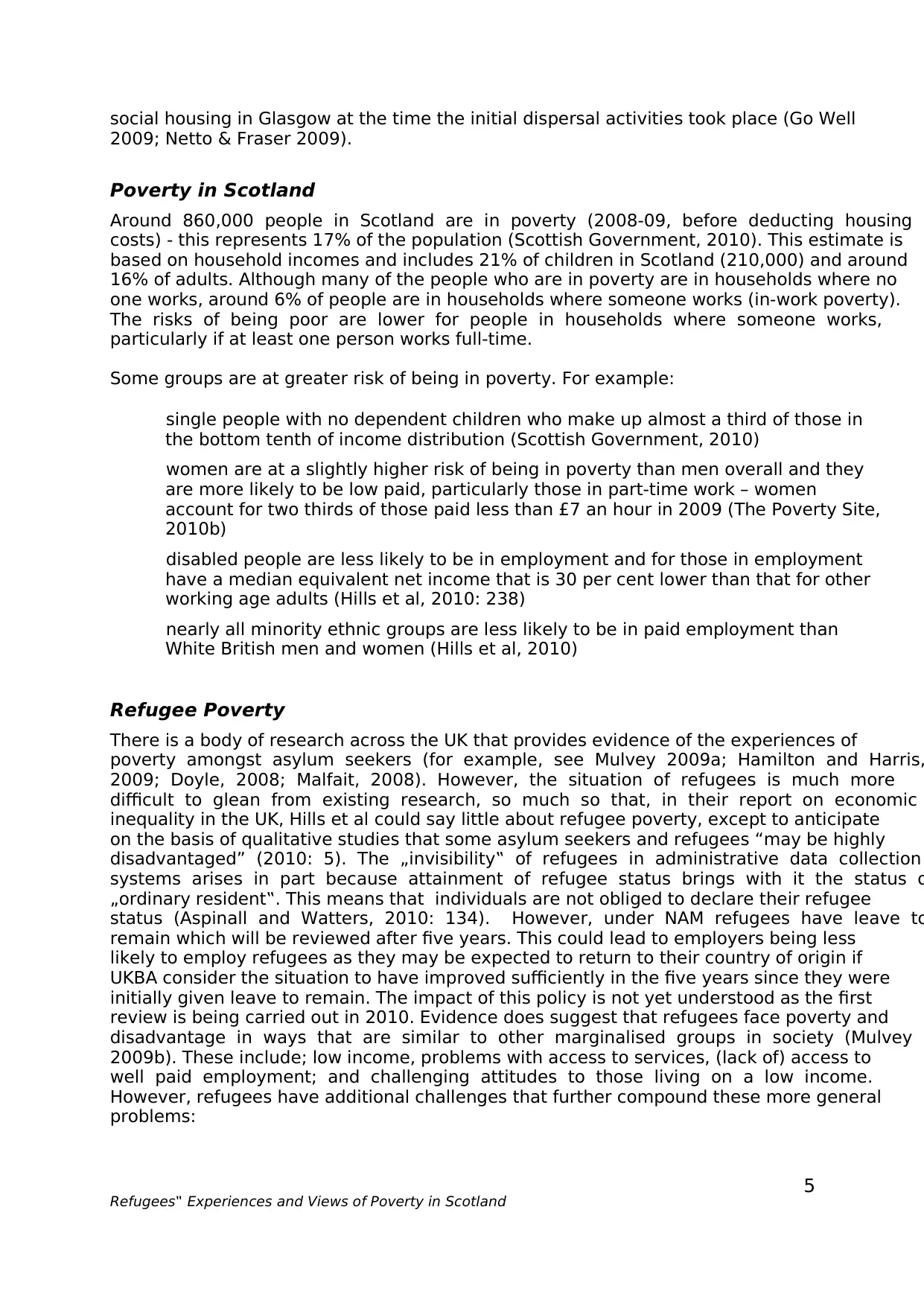
Refugees‟ Experiences and Views of Poverty in Scotland
5
social housing in Glasgow at the time the initial dispersal activities took place (Go Well
2009; Netto & Fraser 2009).
Poverty in Scotland
Around 860,000 people in Scotland are in poverty (2008-09, before deducting housing
costs) - this represents 17% of the population (Scottish Government, 2010). This estimate is
based on household incomes and includes 21% of children in Scotland (210,000) and around
16% of adults. Although many of the people who are in poverty are in households where no
one works, around 6% of people are in households where someone works (in-work poverty).
The risks of being poor are lower for people in households where someone works,
particularly if at least one person works full-time.
Some groups are at greater risk of being in poverty. For example:
single people with no dependent children who make up almost a third of those in
the bottom tenth of income distribution (Scottish Government, 2010)
women are at a slightly higher risk of being in poverty than men overall and they
are more likely to be low paid, particularly those in part-time work – women
account for two thirds of those paid less than £7 an hour in 2009 (The Poverty Site,
2010b)
disabled people are less likely to be in employment and for those in employment
have a median equivalent net income that is 30 per cent lower than that for other
working age adults (Hills et al, 2010: 238)
nearly all minority ethnic groups are less likely to be in paid employment than
White British men and women (Hills et al, 2010)
Refugee Poverty
There is a body of research across the UK that provides evidence of the experiences of
poverty amongst asylum seekers (for example, see Mulvey 2009a; Hamilton and Harris,
2009; Doyle, 2008; Malfait, 2008). However, the situation of refugees is much more
difficult to glean from existing research, so much so that, in their report on economic
inequality in the UK, Hills et al could say little about refugee poverty, except to anticipate
on the basis of qualitative studies that some asylum seekers and refugees “may be highly
disadvantaged” (2010: 5). The „invisibility‟ of refugees in administrative data collection
systems arises in part because attainment of refugee status brings with it the status o
„ordinary resident‟. This means that individuals are not obliged to declare their refugee
status (Aspinall and Watters, 2010: 134). However, under NAM refugees have leave to
remain which will be reviewed after five years. This could lead to employers being less
likely to employ refugees as they may be expected to return to their country of origin if
UKBA consider the situation to have improved sufficiently in the five years since they were
initially given leave to remain. The impact of this policy is not yet understood as the first
review is being carried out in 2010. Evidence does suggest that refugees face poverty and
disadvantage in ways that are similar to other marginalised groups in society (Mulvey
2009b). These include; low income, problems with access to services, (lack of) access to
well paid employment; and challenging attitudes to those living on a low income.
However, refugees have additional challenges that further compound these more general
problems:
5
social housing in Glasgow at the time the initial dispersal activities took place (Go Well
2009; Netto & Fraser 2009).
Poverty in Scotland
Around 860,000 people in Scotland are in poverty (2008-09, before deducting housing
costs) - this represents 17% of the population (Scottish Government, 2010). This estimate is
based on household incomes and includes 21% of children in Scotland (210,000) and around
16% of adults. Although many of the people who are in poverty are in households where no
one works, around 6% of people are in households where someone works (in-work poverty).
The risks of being poor are lower for people in households where someone works,
particularly if at least one person works full-time.
Some groups are at greater risk of being in poverty. For example:
single people with no dependent children who make up almost a third of those in
the bottom tenth of income distribution (Scottish Government, 2010)
women are at a slightly higher risk of being in poverty than men overall and they
are more likely to be low paid, particularly those in part-time work – women
account for two thirds of those paid less than £7 an hour in 2009 (The Poverty Site,
2010b)
disabled people are less likely to be in employment and for those in employment
have a median equivalent net income that is 30 per cent lower than that for other
working age adults (Hills et al, 2010: 238)
nearly all minority ethnic groups are less likely to be in paid employment than
White British men and women (Hills et al, 2010)
Refugee Poverty
There is a body of research across the UK that provides evidence of the experiences of
poverty amongst asylum seekers (for example, see Mulvey 2009a; Hamilton and Harris,
2009; Doyle, 2008; Malfait, 2008). However, the situation of refugees is much more
difficult to glean from existing research, so much so that, in their report on economic
inequality in the UK, Hills et al could say little about refugee poverty, except to anticipate
on the basis of qualitative studies that some asylum seekers and refugees “may be highly
disadvantaged” (2010: 5). The „invisibility‟ of refugees in administrative data collection
systems arises in part because attainment of refugee status brings with it the status o
„ordinary resident‟. This means that individuals are not obliged to declare their refugee
status (Aspinall and Watters, 2010: 134). However, under NAM refugees have leave to
remain which will be reviewed after five years. This could lead to employers being less
likely to employ refugees as they may be expected to return to their country of origin if
UKBA consider the situation to have improved sufficiently in the five years since they were
initially given leave to remain. The impact of this policy is not yet understood as the first
review is being carried out in 2010. Evidence does suggest that refugees face poverty and
disadvantage in ways that are similar to other marginalised groups in society (Mulvey
2009b). These include; low income, problems with access to services, (lack of) access to
well paid employment; and challenging attitudes to those living on a low income.
However, refugees have additional challenges that further compound these more general
problems:
⊘ This is a preview!⊘
Do you want full access?
Subscribe today to unlock all pages.

Trusted by 1+ million students worldwide
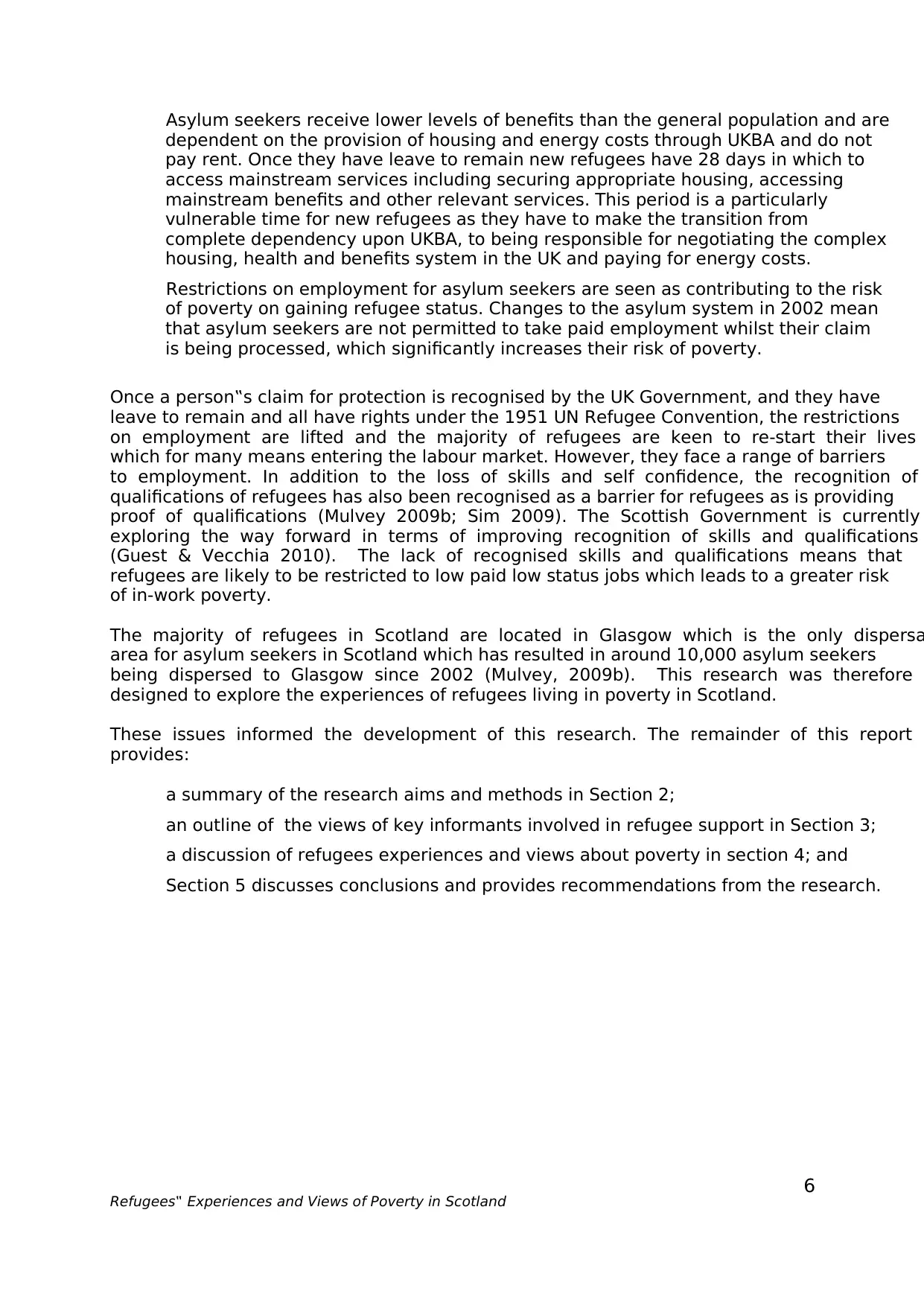
Refugees‟ Experiences and Views of Poverty in Scotland
6
Asylum seekers receive lower levels of benefits than the general population and are
dependent on the provision of housing and energy costs through UKBA and do not
pay rent. Once they have leave to remain new refugees have 28 days in which to
access mainstream services including securing appropriate housing, accessing
mainstream benefits and other relevant services. This period is a particularly
vulnerable time for new refugees as they have to make the transition from
complete dependency upon UKBA, to being responsible for negotiating the complex
housing, health and benefits system in the UK and paying for energy costs.
Restrictions on employment for asylum seekers are seen as contributing to the risk
of poverty on gaining refugee status. Changes to the asylum system in 2002 mean
that asylum seekers are not permitted to take paid employment whilst their claim
is being processed, which significantly increases their risk of poverty.
Once a person‟s claim for protection is recognised by the UK Government, and they have
leave to remain and all have rights under the 1951 UN Refugee Convention, the restrictions
on employment are lifted and the majority of refugees are keen to re-start their lives
which for many means entering the labour market. However, they face a range of barriers
to employment. In addition to the loss of skills and self confidence, the recognition of
qualifications of refugees has also been recognised as a barrier for refugees as is providing
proof of qualifications (Mulvey 2009b; Sim 2009). The Scottish Government is currently
exploring the way forward in terms of improving recognition of skills and qualifications
(Guest & Vecchia 2010). The lack of recognised skills and qualifications means that
refugees are likely to be restricted to low paid low status jobs which leads to a greater risk
of in-work poverty.
The majority of refugees in Scotland are located in Glasgow which is the only dispersa
area for asylum seekers in Scotland which has resulted in around 10,000 asylum seekers
being dispersed to Glasgow since 2002 (Mulvey, 2009b). This research was therefore
designed to explore the experiences of refugees living in poverty in Scotland.
These issues informed the development of this research. The remainder of this report
provides:
a summary of the research aims and methods in Section 2;
an outline of the views of key informants involved in refugee support in Section 3;
a discussion of refugees experiences and views about poverty in section 4; and
Section 5 discusses conclusions and provides recommendations from the research.
6
Asylum seekers receive lower levels of benefits than the general population and are
dependent on the provision of housing and energy costs through UKBA and do not
pay rent. Once they have leave to remain new refugees have 28 days in which to
access mainstream services including securing appropriate housing, accessing
mainstream benefits and other relevant services. This period is a particularly
vulnerable time for new refugees as they have to make the transition from
complete dependency upon UKBA, to being responsible for negotiating the complex
housing, health and benefits system in the UK and paying for energy costs.
Restrictions on employment for asylum seekers are seen as contributing to the risk
of poverty on gaining refugee status. Changes to the asylum system in 2002 mean
that asylum seekers are not permitted to take paid employment whilst their claim
is being processed, which significantly increases their risk of poverty.
Once a person‟s claim for protection is recognised by the UK Government, and they have
leave to remain and all have rights under the 1951 UN Refugee Convention, the restrictions
on employment are lifted and the majority of refugees are keen to re-start their lives
which for many means entering the labour market. However, they face a range of barriers
to employment. In addition to the loss of skills and self confidence, the recognition of
qualifications of refugees has also been recognised as a barrier for refugees as is providing
proof of qualifications (Mulvey 2009b; Sim 2009). The Scottish Government is currently
exploring the way forward in terms of improving recognition of skills and qualifications
(Guest & Vecchia 2010). The lack of recognised skills and qualifications means that
refugees are likely to be restricted to low paid low status jobs which leads to a greater risk
of in-work poverty.
The majority of refugees in Scotland are located in Glasgow which is the only dispersa
area for asylum seekers in Scotland which has resulted in around 10,000 asylum seekers
being dispersed to Glasgow since 2002 (Mulvey, 2009b). This research was therefore
designed to explore the experiences of refugees living in poverty in Scotland.
These issues informed the development of this research. The remainder of this report
provides:
a summary of the research aims and methods in Section 2;
an outline of the views of key informants involved in refugee support in Section 3;
a discussion of refugees experiences and views about poverty in section 4; and
Section 5 discusses conclusions and provides recommendations from the research.
Paraphrase This Document
Need a fresh take? Get an instant paraphrase of this document with our AI Paraphraser
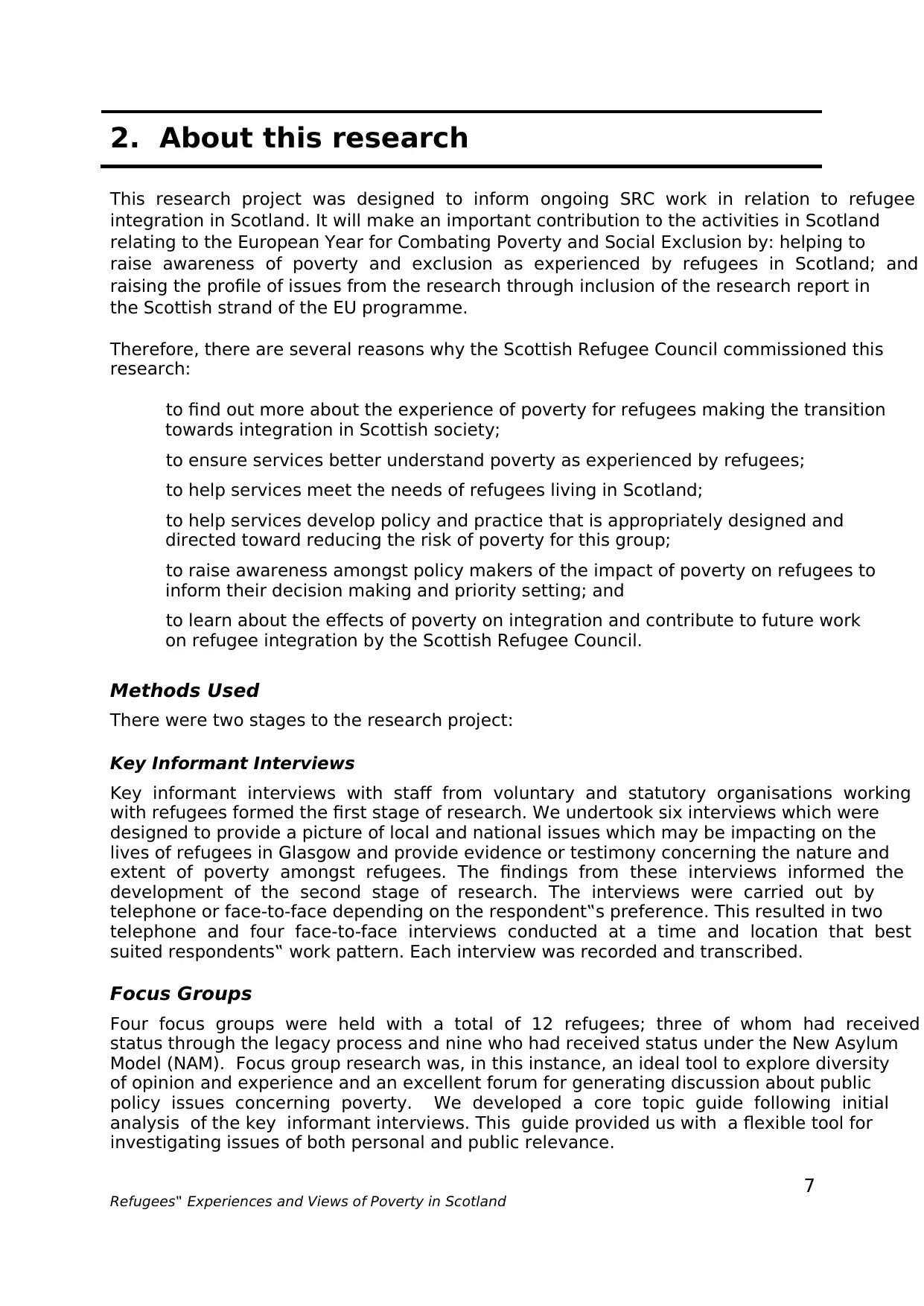
Refugees‟ Experiences and Views of Poverty in Scotland
7
2. About this research
This research project was designed to inform ongoing SRC work in relation to refugee
integration in Scotland. It will make an important contribution to the activities in Scotland
relating to the European Year for Combating Poverty and Social Exclusion by: helping to
raise awareness of poverty and exclusion as experienced by refugees in Scotland; and
raising the profile of issues from the research through inclusion of the research report in
the Scottish strand of the EU programme.
Therefore, there are several reasons why the Scottish Refugee Council commissioned this
research:
to find out more about the experience of poverty for refugees making the transition
towards integration in Scottish society;
to ensure services better understand poverty as experienced by refugees;
to help services meet the needs of refugees living in Scotland;
to help services develop policy and practice that is appropriately designed and
directed toward reducing the risk of poverty for this group;
to raise awareness amongst policy makers of the impact of poverty on refugees to
inform their decision making and priority setting; and
to learn about the effects of poverty on integration and contribute to future work
on refugee integration by the Scottish Refugee Council.
Methods Used
There were two stages to the research project:
Key Informant Interviews
Key informant interviews with staff from voluntary and statutory organisations working
with refugees formed the first stage of research. We undertook six interviews which were
designed to provide a picture of local and national issues which may be impacting on the
lives of refugees in Glasgow and provide evidence or testimony concerning the nature and
extent of poverty amongst refugees. The findings from these interviews informed the
development of the second stage of research. The interviews were carried out by
telephone or face-to-face depending on the respondent‟s preference. This resulted in two
telephone and four face-to-face interviews conducted at a time and location that best
suited respondents‟ work pattern. Each interview was recorded and transcribed.
Focus Groups
Four focus groups were held with a total of 12 refugees; three of whom had received
status through the legacy process and nine who had received status under the New Asylum
Model (NAM). Focus group research was, in this instance, an ideal tool to explore diversity
of opinion and experience and an excellent forum for generating discussion about public
policy issues concerning poverty. We developed a core topic guide following initial
analysis of the key informant interviews. This guide provided us with a flexible tool for
investigating issues of both personal and public relevance.
7
2. About this research
This research project was designed to inform ongoing SRC work in relation to refugee
integration in Scotland. It will make an important contribution to the activities in Scotland
relating to the European Year for Combating Poverty and Social Exclusion by: helping to
raise awareness of poverty and exclusion as experienced by refugees in Scotland; and
raising the profile of issues from the research through inclusion of the research report in
the Scottish strand of the EU programme.
Therefore, there are several reasons why the Scottish Refugee Council commissioned this
research:
to find out more about the experience of poverty for refugees making the transition
towards integration in Scottish society;
to ensure services better understand poverty as experienced by refugees;
to help services meet the needs of refugees living in Scotland;
to help services develop policy and practice that is appropriately designed and
directed toward reducing the risk of poverty for this group;
to raise awareness amongst policy makers of the impact of poverty on refugees to
inform their decision making and priority setting; and
to learn about the effects of poverty on integration and contribute to future work
on refugee integration by the Scottish Refugee Council.
Methods Used
There were two stages to the research project:
Key Informant Interviews
Key informant interviews with staff from voluntary and statutory organisations working
with refugees formed the first stage of research. We undertook six interviews which were
designed to provide a picture of local and national issues which may be impacting on the
lives of refugees in Glasgow and provide evidence or testimony concerning the nature and
extent of poverty amongst refugees. The findings from these interviews informed the
development of the second stage of research. The interviews were carried out by
telephone or face-to-face depending on the respondent‟s preference. This resulted in two
telephone and four face-to-face interviews conducted at a time and location that best
suited respondents‟ work pattern. Each interview was recorded and transcribed.
Focus Groups
Four focus groups were held with a total of 12 refugees; three of whom had received
status through the legacy process and nine who had received status under the New Asylum
Model (NAM). Focus group research was, in this instance, an ideal tool to explore diversity
of opinion and experience and an excellent forum for generating discussion about public
policy issues concerning poverty. We developed a core topic guide following initial
analysis of the key informant interviews. This guide provided us with a flexible tool for
investigating issues of both personal and public relevance.
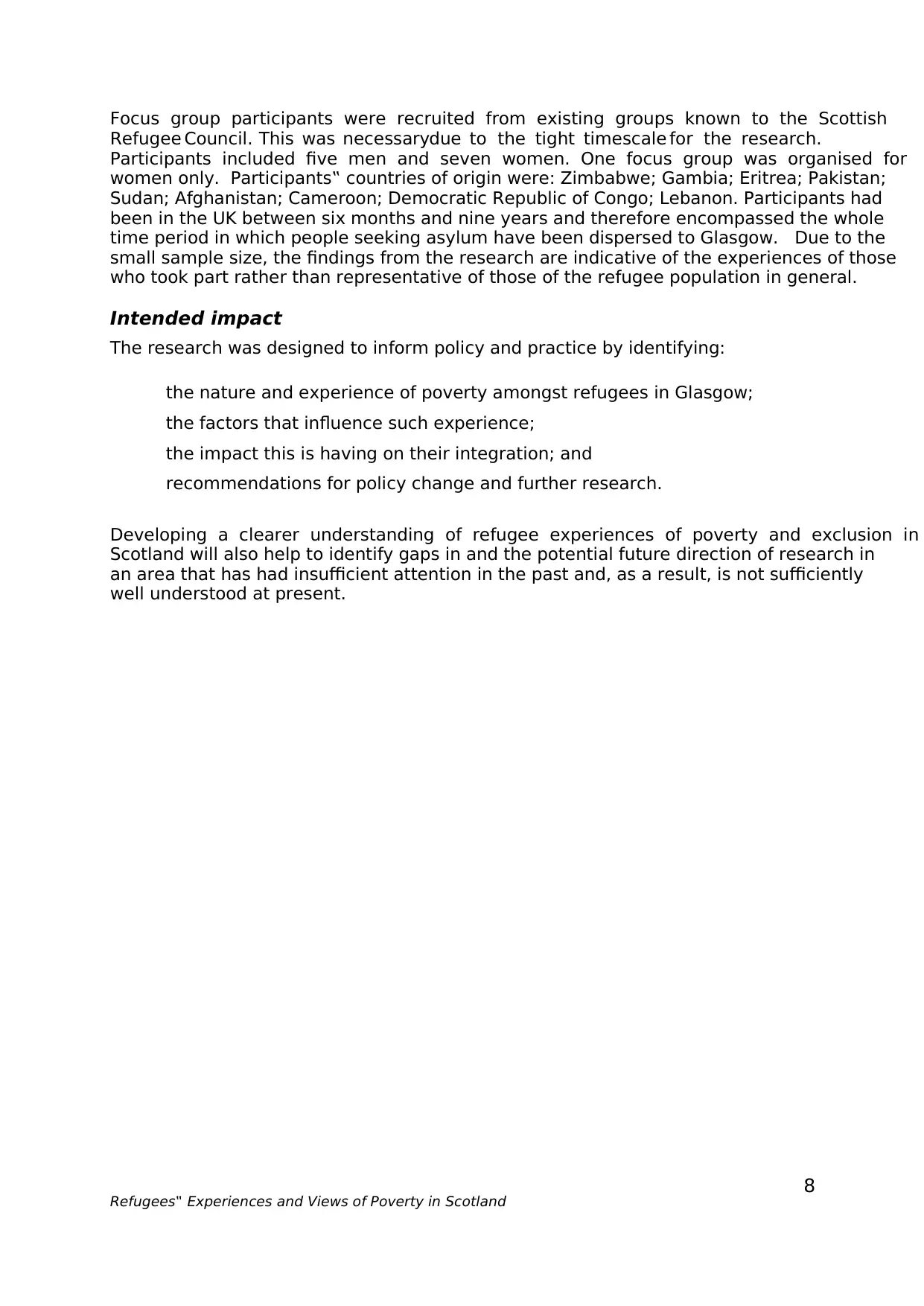
Refugees‟ Experiences and Views of Poverty in Scotland
8
Focus group participants were recruited from existing groups known to the Scottish
Refugee Council. This was necessarydue to the tight timescale for the research.
Participants included five men and seven women. One focus group was organised for
women only. Participants‟ countries of origin were: Zimbabwe; Gambia; Eritrea; Pakistan;
Sudan; Afghanistan; Cameroon; Democratic Republic of Congo; Lebanon. Participants had
been in the UK between six months and nine years and therefore encompassed the whole
time period in which people seeking asylum have been dispersed to Glasgow. Due to the
small sample size, the findings from the research are indicative of the experiences of those
who took part rather than representative of those of the refugee population in general.
Intended impact
The research was designed to inform policy and practice by identifying:
the nature and experience of poverty amongst refugees in Glasgow;
the factors that influence such experience;
the impact this is having on their integration; and
recommendations for policy change and further research.
Developing a clearer understanding of refugee experiences of poverty and exclusion in
Scotland will also help to identify gaps in and the potential future direction of research in
an area that has had insufficient attention in the past and, as a result, is not sufficiently
well understood at present.
8
Focus group participants were recruited from existing groups known to the Scottish
Refugee Council. This was necessarydue to the tight timescale for the research.
Participants included five men and seven women. One focus group was organised for
women only. Participants‟ countries of origin were: Zimbabwe; Gambia; Eritrea; Pakistan;
Sudan; Afghanistan; Cameroon; Democratic Republic of Congo; Lebanon. Participants had
been in the UK between six months and nine years and therefore encompassed the whole
time period in which people seeking asylum have been dispersed to Glasgow. Due to the
small sample size, the findings from the research are indicative of the experiences of those
who took part rather than representative of those of the refugee population in general.
Intended impact
The research was designed to inform policy and practice by identifying:
the nature and experience of poverty amongst refugees in Glasgow;
the factors that influence such experience;
the impact this is having on their integration; and
recommendations for policy change and further research.
Developing a clearer understanding of refugee experiences of poverty and exclusion in
Scotland will also help to identify gaps in and the potential future direction of research in
an area that has had insufficient attention in the past and, as a result, is not sufficiently
well understood at present.
⊘ This is a preview!⊘
Do you want full access?
Subscribe today to unlock all pages.

Trusted by 1+ million students worldwide
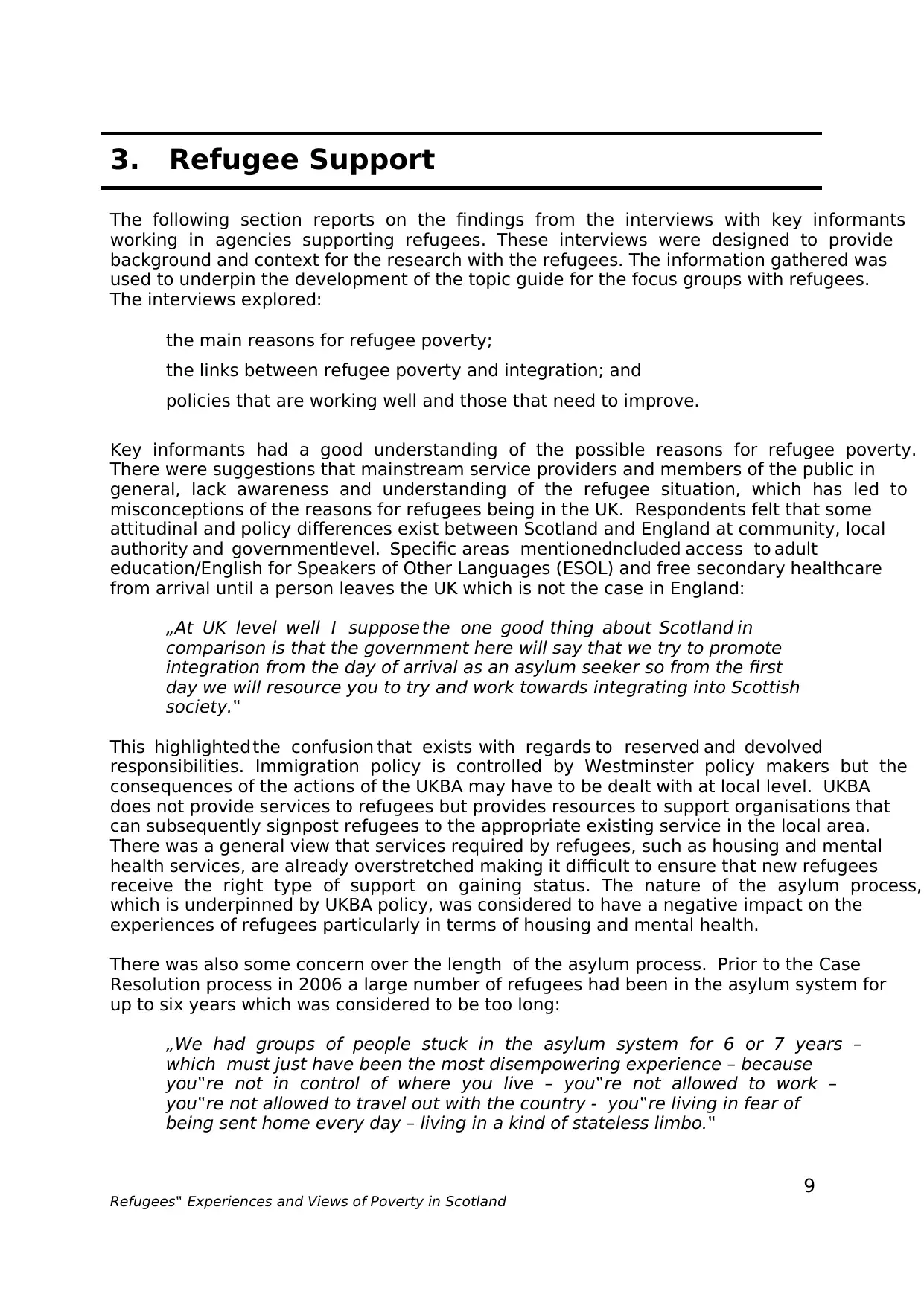
Refugees‟ Experiences and Views of Poverty in Scotland
9
3. Refugee Support
The following section reports on the findings from the interviews with key informants
working in agencies supporting refugees. These interviews were designed to provide
background and context for the research with the refugees. The information gathered was
used to underpin the development of the topic guide for the focus groups with refugees.
The interviews explored:
the main reasons for refugee poverty;
the links between refugee poverty and integration; and
policies that are working well and those that need to improve.
Key informants had a good understanding of the possible reasons for refugee poverty.
There were suggestions that mainstream service providers and members of the public in
general, lack awareness and understanding of the refugee situation, which has led to
misconceptions of the reasons for refugees being in the UK. Respondents felt that some
attitudinal and policy differences exist between Scotland and England at community, local
authority and governmentlevel. Specific areas mentionedincluded access to adult
education/English for Speakers of Other Languages (ESOL) and free secondary healthcare
from arrival until a person leaves the UK which is not the case in England:
„At UK level well I suppose the one good thing about Scotland in
comparison is that the government here will say that we try to promote
integration from the day of arrival as an asylum seeker so from the first
day we will resource you to try and work towards integrating into Scottish
society.‟
This highlighted the confusion that exists with regards to reserved and devolved
responsibilities. Immigration policy is controlled by Westminster policy makers but the
consequences of the actions of the UKBA may have to be dealt with at local level. UKBA
does not provide services to refugees but provides resources to support organisations that
can subsequently signpost refugees to the appropriate existing service in the local area.
There was a general view that services required by refugees, such as housing and mental
health services, are already overstretched making it difficult to ensure that new refugees
receive the right type of support on gaining status. The nature of the asylum process,
which is underpinned by UKBA policy, was considered to have a negative impact on the
experiences of refugees particularly in terms of housing and mental health.
There was also some concern over the length of the asylum process. Prior to the Case
Resolution process in 2006 a large number of refugees had been in the asylum system for
up to six years which was considered to be too long:
„We had groups of people stuck in the asylum system for 6 or 7 years –
which must just have been the most disempowering experience – because
you‟re not in control of where you live – you‟re not allowed to work –
you‟re not allowed to travel out with the country - you‟re living in fear of
being sent home every day – living in a kind of stateless limbo.‟
9
3. Refugee Support
The following section reports on the findings from the interviews with key informants
working in agencies supporting refugees. These interviews were designed to provide
background and context for the research with the refugees. The information gathered was
used to underpin the development of the topic guide for the focus groups with refugees.
The interviews explored:
the main reasons for refugee poverty;
the links between refugee poverty and integration; and
policies that are working well and those that need to improve.
Key informants had a good understanding of the possible reasons for refugee poverty.
There were suggestions that mainstream service providers and members of the public in
general, lack awareness and understanding of the refugee situation, which has led to
misconceptions of the reasons for refugees being in the UK. Respondents felt that some
attitudinal and policy differences exist between Scotland and England at community, local
authority and governmentlevel. Specific areas mentionedincluded access to adult
education/English for Speakers of Other Languages (ESOL) and free secondary healthcare
from arrival until a person leaves the UK which is not the case in England:
„At UK level well I suppose the one good thing about Scotland in
comparison is that the government here will say that we try to promote
integration from the day of arrival as an asylum seeker so from the first
day we will resource you to try and work towards integrating into Scottish
society.‟
This highlighted the confusion that exists with regards to reserved and devolved
responsibilities. Immigration policy is controlled by Westminster policy makers but the
consequences of the actions of the UKBA may have to be dealt with at local level. UKBA
does not provide services to refugees but provides resources to support organisations that
can subsequently signpost refugees to the appropriate existing service in the local area.
There was a general view that services required by refugees, such as housing and mental
health services, are already overstretched making it difficult to ensure that new refugees
receive the right type of support on gaining status. The nature of the asylum process,
which is underpinned by UKBA policy, was considered to have a negative impact on the
experiences of refugees particularly in terms of housing and mental health.
There was also some concern over the length of the asylum process. Prior to the Case
Resolution process in 2006 a large number of refugees had been in the asylum system for
up to six years which was considered to be too long:
„We had groups of people stuck in the asylum system for 6 or 7 years –
which must just have been the most disempowering experience – because
you‟re not in control of where you live – you‟re not allowed to work –
you‟re not allowed to travel out with the country - you‟re living in fear of
being sent home every day – living in a kind of stateless limbo.‟
Paraphrase This Document
Need a fresh take? Get an instant paraphrase of this document with our AI Paraphraser
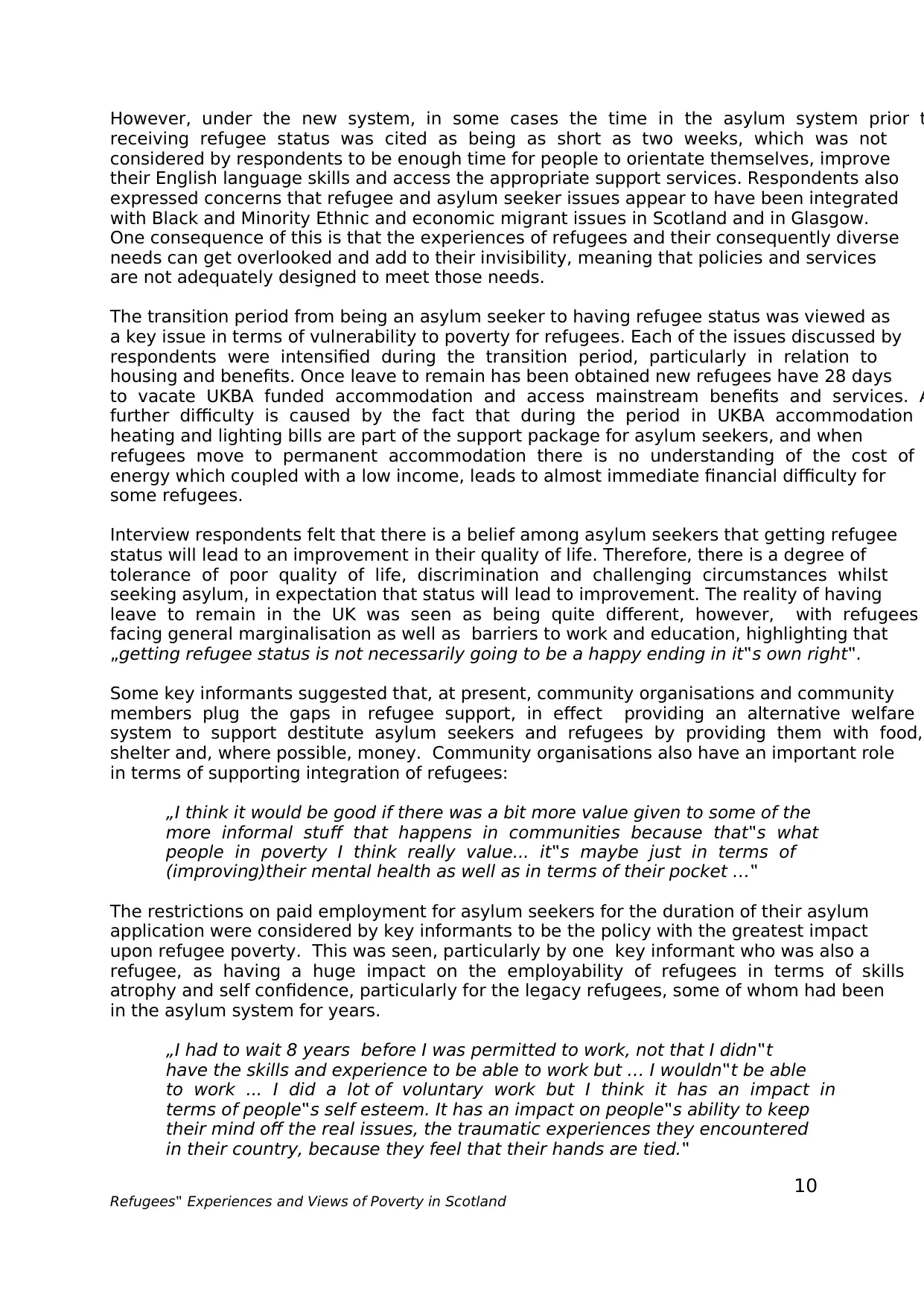
Refugees‟ Experiences and Views of Poverty in Scotland
10
However, under the new system, in some cases the time in the asylum system prior t
receiving refugee status was cited as being as short as two weeks, which was not
considered by respondents to be enough time for people to orientate themselves, improve
their English language skills and access the appropriate support services. Respondents also
expressed concerns that refugee and asylum seeker issues appear to have been integrated
with Black and Minority Ethnic and economic migrant issues in Scotland and in Glasgow.
One consequence of this is that the experiences of refugees and their consequently diverse
needs can get overlooked and add to their invisibility, meaning that policies and services
are not adequately designed to meet those needs.
The transition period from being an asylum seeker to having refugee status was viewed as
a key issue in terms of vulnerability to poverty for refugees. Each of the issues discussed by
respondents were intensified during the transition period, particularly in relation to
housing and benefits. Once leave to remain has been obtained new refugees have 28 days
to vacate UKBA funded accommodation and access mainstream benefits and services. A
further difficulty is caused by the fact that during the period in UKBA accommodation
heating and lighting bills are part of the support package for asylum seekers, and when
refugees move to permanent accommodation there is no understanding of the cost of
energy which coupled with a low income, leads to almost immediate financial difficulty for
some refugees.
Interview respondents felt that there is a belief among asylum seekers that getting refugee
status will lead to an improvement in their quality of life. Therefore, there is a degree of
tolerance of poor quality of life, discrimination and challenging circumstances whilst
seeking asylum, in expectation that status will lead to improvement. The reality of having
leave to remain in the UK was seen as being quite different, however, with refugees
facing general marginalisation as well as barriers to work and education, highlighting that
„getting refugee status is not necessarily going to be a happy ending in it‟s own right‟.
Some key informants suggested that, at present, community organisations and community
members plug the gaps in refugee support, in effect providing an alternative welfare
system to support destitute asylum seekers and refugees by providing them with food,
shelter and, where possible, money. Community organisations also have an important role
in terms of supporting integration of refugees:
„I think it would be good if there was a bit more value given to some of the
more informal stuff that happens in communities because that‟s what
people in poverty I think really value... it‟s maybe just in terms of
(improving)their mental health as well as in terms of their pocket …‟
The restrictions on paid employment for asylum seekers for the duration of their asylum
application were considered by key informants to be the policy with the greatest impact
upon refugee poverty. This was seen, particularly by one key informant who was also a
refugee, as having a huge impact on the employability of refugees in terms of skills
atrophy and self confidence, particularly for the legacy refugees, some of whom had been
in the asylum system for years.
„I had to wait 8 years before I was permitted to work, not that I didn‟t
have the skills and experience to be able to work but … I wouldn‟t be able
to work ... I did a lot of voluntary work but I think it has an impact in
terms of people‟s self esteem. It has an impact on people‟s ability to keep
their mind off the real issues, the traumatic experiences they encountered
in their country, because they feel that their hands are tied.‟
10
However, under the new system, in some cases the time in the asylum system prior t
receiving refugee status was cited as being as short as two weeks, which was not
considered by respondents to be enough time for people to orientate themselves, improve
their English language skills and access the appropriate support services. Respondents also
expressed concerns that refugee and asylum seeker issues appear to have been integrated
with Black and Minority Ethnic and economic migrant issues in Scotland and in Glasgow.
One consequence of this is that the experiences of refugees and their consequently diverse
needs can get overlooked and add to their invisibility, meaning that policies and services
are not adequately designed to meet those needs.
The transition period from being an asylum seeker to having refugee status was viewed as
a key issue in terms of vulnerability to poverty for refugees. Each of the issues discussed by
respondents were intensified during the transition period, particularly in relation to
housing and benefits. Once leave to remain has been obtained new refugees have 28 days
to vacate UKBA funded accommodation and access mainstream benefits and services. A
further difficulty is caused by the fact that during the period in UKBA accommodation
heating and lighting bills are part of the support package for asylum seekers, and when
refugees move to permanent accommodation there is no understanding of the cost of
energy which coupled with a low income, leads to almost immediate financial difficulty for
some refugees.
Interview respondents felt that there is a belief among asylum seekers that getting refugee
status will lead to an improvement in their quality of life. Therefore, there is a degree of
tolerance of poor quality of life, discrimination and challenging circumstances whilst
seeking asylum, in expectation that status will lead to improvement. The reality of having
leave to remain in the UK was seen as being quite different, however, with refugees
facing general marginalisation as well as barriers to work and education, highlighting that
„getting refugee status is not necessarily going to be a happy ending in it‟s own right‟.
Some key informants suggested that, at present, community organisations and community
members plug the gaps in refugee support, in effect providing an alternative welfare
system to support destitute asylum seekers and refugees by providing them with food,
shelter and, where possible, money. Community organisations also have an important role
in terms of supporting integration of refugees:
„I think it would be good if there was a bit more value given to some of the
more informal stuff that happens in communities because that‟s what
people in poverty I think really value... it‟s maybe just in terms of
(improving)their mental health as well as in terms of their pocket …‟
The restrictions on paid employment for asylum seekers for the duration of their asylum
application were considered by key informants to be the policy with the greatest impact
upon refugee poverty. This was seen, particularly by one key informant who was also a
refugee, as having a huge impact on the employability of refugees in terms of skills
atrophy and self confidence, particularly for the legacy refugees, some of whom had been
in the asylum system for years.
„I had to wait 8 years before I was permitted to work, not that I didn‟t
have the skills and experience to be able to work but … I wouldn‟t be able
to work ... I did a lot of voluntary work but I think it has an impact in
terms of people‟s self esteem. It has an impact on people‟s ability to keep
their mind off the real issues, the traumatic experiences they encountered
in their country, because they feel that their hands are tied.‟
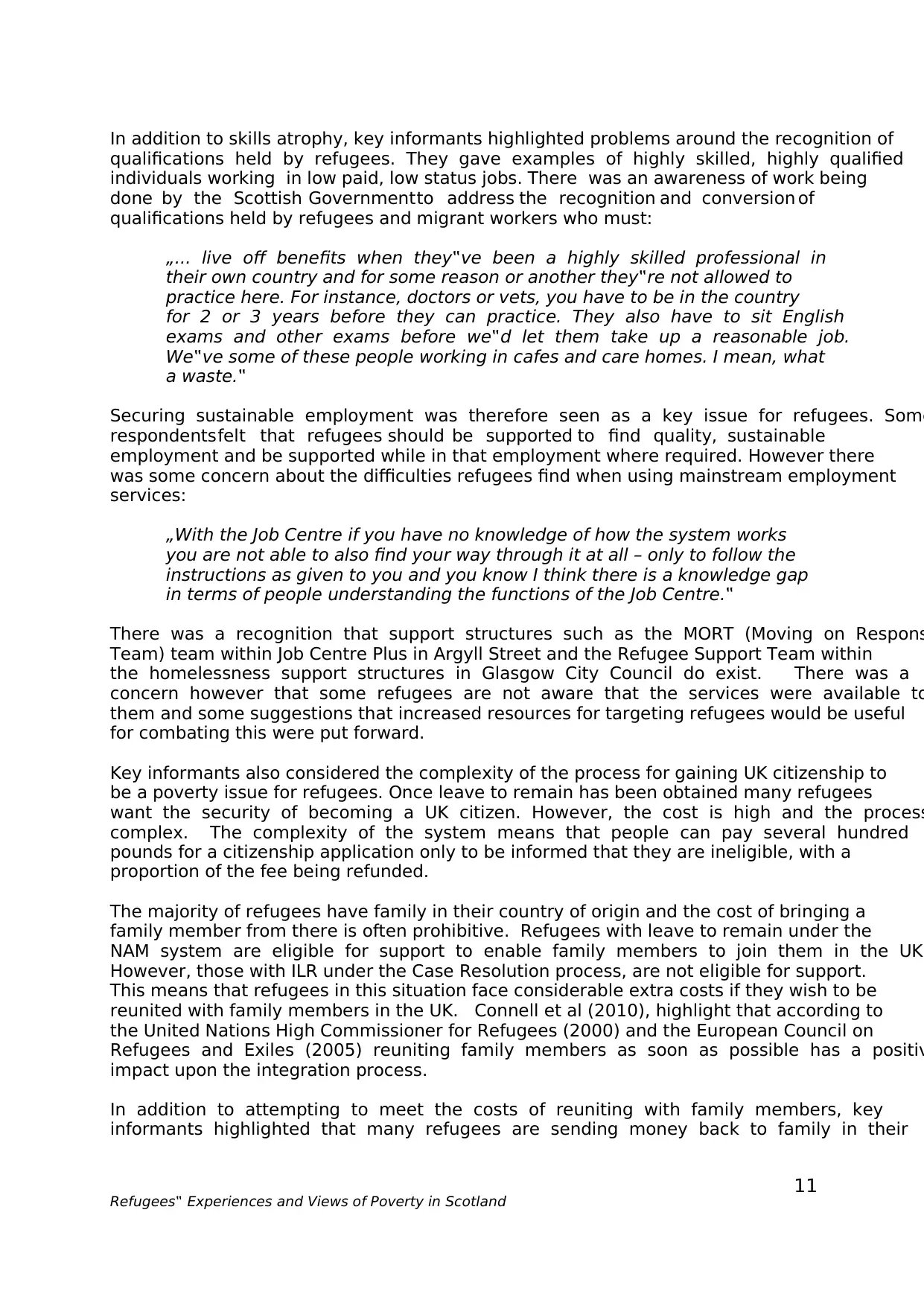
Refugees‟ Experiences and Views of Poverty in Scotland
11
In addition to skills atrophy, key informants highlighted problems around the recognition of
qualifications held by refugees. They gave examples of highly skilled, highly qualified
individuals working in low paid, low status jobs. There was an awareness of work being
done by the Scottish Government to address the recognition and conversion of
qualifications held by refugees and migrant workers who must:
„... live off benefits when they‟ve been a highly skilled professional in
their own country and for some reason or another they‟re not allowed to
practice here. For instance, doctors or vets, you have to be in the country
for 2 or 3 years before they can practice. They also have to sit English
exams and other exams before we‟d let them take up a reasonable job.
We‟ve some of these people working in cafes and care homes. I mean, what
a waste.‟
Securing sustainable employment was therefore seen as a key issue for refugees. Some
respondents felt that refugees should be supported to find quality, sustainable
employment and be supported while in that employment where required. However there
was some concern about the difficulties refugees find when using mainstream employment
services:
„With the Job Centre if you have no knowledge of how the system works
you are not able to also find your way through it at all – only to follow the
instructions as given to you and you know I think there is a knowledge gap
in terms of people understanding the functions of the Job Centre.‟
There was a recognition that support structures such as the MORT (Moving on Respons
Team) team within Job Centre Plus in Argyll Street and the Refugee Support Team within
the homelessness support structures in Glasgow City Council do exist. There was a
concern however that some refugees are not aware that the services were available to
them and some suggestions that increased resources for targeting refugees would be useful
for combating this were put forward.
Key informants also considered the complexity of the process for gaining UK citizenship to
be a poverty issue for refugees. Once leave to remain has been obtained many refugees
want the security of becoming a UK citizen. However, the cost is high and the process
complex. The complexity of the system means that people can pay several hundred
pounds for a citizenship application only to be informed that they are ineligible, with a
proportion of the fee being refunded.
The majority of refugees have family in their country of origin and the cost of bringing a
family member from there is often prohibitive. Refugees with leave to remain under the
NAM system are eligible for support to enable family members to join them in the UK.
However, those with ILR under the Case Resolution process, are not eligible for support.
This means that refugees in this situation face considerable extra costs if they wish to be
reunited with family members in the UK. Connell et al (2010), highlight that according to
the United Nations High Commissioner for Refugees (2000) and the European Council on
Refugees and Exiles (2005) reuniting family members as soon as possible has a positiv
impact upon the integration process.
In addition to attempting to meet the costs of reuniting with family members, key
informants highlighted that many refugees are sending money back to family in their
11
In addition to skills atrophy, key informants highlighted problems around the recognition of
qualifications held by refugees. They gave examples of highly skilled, highly qualified
individuals working in low paid, low status jobs. There was an awareness of work being
done by the Scottish Government to address the recognition and conversion of
qualifications held by refugees and migrant workers who must:
„... live off benefits when they‟ve been a highly skilled professional in
their own country and for some reason or another they‟re not allowed to
practice here. For instance, doctors or vets, you have to be in the country
for 2 or 3 years before they can practice. They also have to sit English
exams and other exams before we‟d let them take up a reasonable job.
We‟ve some of these people working in cafes and care homes. I mean, what
a waste.‟
Securing sustainable employment was therefore seen as a key issue for refugees. Some
respondents felt that refugees should be supported to find quality, sustainable
employment and be supported while in that employment where required. However there
was some concern about the difficulties refugees find when using mainstream employment
services:
„With the Job Centre if you have no knowledge of how the system works
you are not able to also find your way through it at all – only to follow the
instructions as given to you and you know I think there is a knowledge gap
in terms of people understanding the functions of the Job Centre.‟
There was a recognition that support structures such as the MORT (Moving on Respons
Team) team within Job Centre Plus in Argyll Street and the Refugee Support Team within
the homelessness support structures in Glasgow City Council do exist. There was a
concern however that some refugees are not aware that the services were available to
them and some suggestions that increased resources for targeting refugees would be useful
for combating this were put forward.
Key informants also considered the complexity of the process for gaining UK citizenship to
be a poverty issue for refugees. Once leave to remain has been obtained many refugees
want the security of becoming a UK citizen. However, the cost is high and the process
complex. The complexity of the system means that people can pay several hundred
pounds for a citizenship application only to be informed that they are ineligible, with a
proportion of the fee being refunded.
The majority of refugees have family in their country of origin and the cost of bringing a
family member from there is often prohibitive. Refugees with leave to remain under the
NAM system are eligible for support to enable family members to join them in the UK.
However, those with ILR under the Case Resolution process, are not eligible for support.
This means that refugees in this situation face considerable extra costs if they wish to be
reunited with family members in the UK. Connell et al (2010), highlight that according to
the United Nations High Commissioner for Refugees (2000) and the European Council on
Refugees and Exiles (2005) reuniting family members as soon as possible has a positiv
impact upon the integration process.
In addition to attempting to meet the costs of reuniting with family members, key
informants highlighted that many refugees are sending money back to family in their
⊘ This is a preview!⊘
Do you want full access?
Subscribe today to unlock all pages.

Trusted by 1+ million students worldwide
1 out of 29
Your All-in-One AI-Powered Toolkit for Academic Success.
+13062052269
info@desklib.com
Available 24*7 on WhatsApp / Email
![[object Object]](/_next/static/media/star-bottom.7253800d.svg)
Unlock your academic potential
Copyright © 2020–2026 A2Z Services. All Rights Reserved. Developed and managed by ZUCOL.